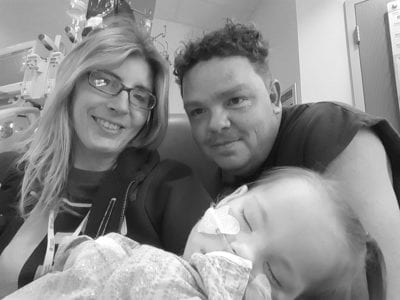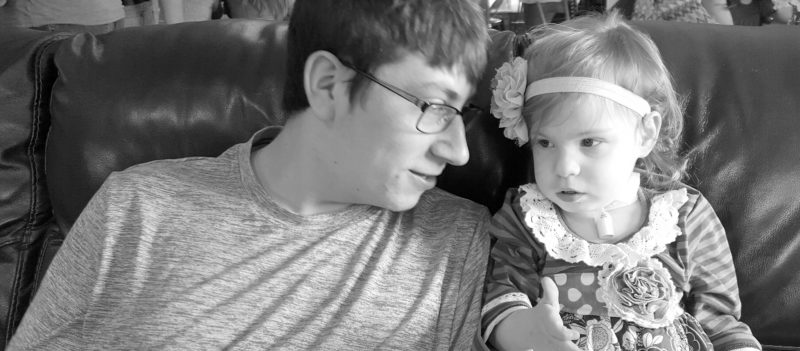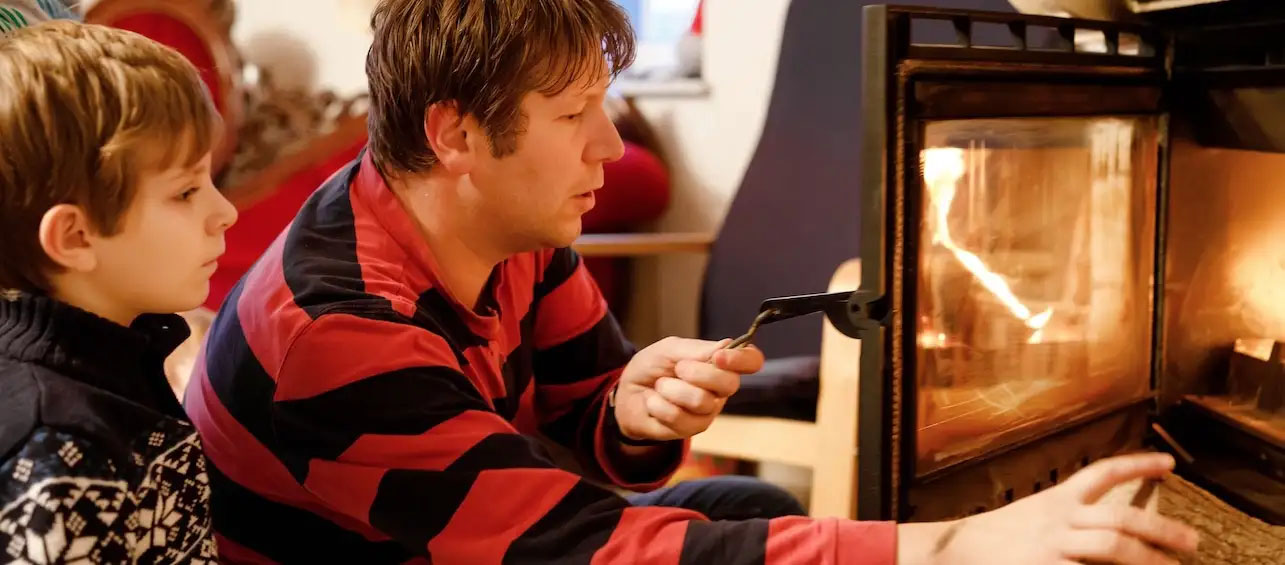Our mighty daughter entered into this world on Christmas Day. Except, she was three months early. Doctors determined that for her safety, it was for the best. She measured 12 inches and weighed only one pound. What an UN-expected gift! We quickly learned that our UN-expectations would soon outweigh our expectations.
Our daughter’s underdeveloped lungs disabled her breathing, causing her to need assistance from a machine. Once stable at two months of age, Ahna was transferred to Cincinnati Children’s. We were immediately comfortable and confident with the staff. A tracheostomy was placed at three months of age on March 31.
Over the next two and a half years our daughter had numerous procedures to determine the continued need for a tracheostomy, frequently check her airway, and eventually reconstruct her airway. I wish I could tell you this was an easy process. But it was not.
When Ahna was hospitalized, I found it difficult to know what to expect or even what questions to ask! Now that Ahna is three years old, I’ve had a chance to reflect on the time she has spent in the hospital. So I’ve compiled a list of things I wished I had known when she was inpatient. I hope that you will find this information helpful on your journey…..
Helpful Tips for When Your Child is Hospitalized
Utilize Holistic Health and the Family Resource Center

The incredible staff is as much there for YOU, the parent/caregiver, as they are your child. While enduring a lengthy, stressful hospitalization following major surgery, Holistic Health came to our room and offered massages…to ME! We also found tons of help within the Family Resource Center – from tickets to a local attractions to assistance helping me find a local dentist to examine the cause of a toothache!
Ask About Discounted Rates and other Extended Stay Options
There may be times that your child will have to stay overnight or for an extended period of time. Your hospital may have discounted rates at numerous hotels in the surrounding area, but we stayed with our daughter in her room, when able. If your hospital has a Ronald McDonald House close by, this may be an option for you. You can submit an application online to see if you qualify, as well as determine the waiting list. They’ll want to know the distance you live from the hospital.
Look into concierge services
At Cincinnati Children’s, their concierge service is called Best Upon Request. They can run errands for you, grab lunch or dinner, and even pick up your dry cleaning! So helpful when you’re spending all of your time and energy with your hospitalized child.
How to communicate with the medical team
Following procedures that require overnight stays, the surgeon who performed your child’s procedure typically won’t be involved with morning or evening rounds. If there are problems or other matters arise, you may request to see the surgeon by letting your nurse know. When their schedule permits – they will be available to you. We saw other familiar faces from our specialist’s team. They typically came around twice daily, kept our surgeon updated and were available if we had any questions.
Mentally prepare yourself for:
- The possibility of your child being in pain. After any surgery, pain and other symptoms can be a tricky task to manage. Following Ahna’s airway reconstruction, it was extremely important to maintain complete sedation for at least one week. She was strapped down and heavily sedated for her own good. We were not able to pick her up, hold her, or care for her in any way. These thoughts are scary, but understand that it’s for the best. Know that your care team wants your child to be healed and up and running as quickly as you do!
- The possibility of the unexpected happening. Sometimes, surgery outcomes are not typical. It’s not expected. We enter into the uncertainty, hoping for the best, and there are situations out of everyone’s control. As a parent that has seen this failure, understand that it can happen. I found peace knowing we were surrounded by the BEST in their field. Each one strived to prepare a successful journey for us. You have to trust that!
- The possibility that your child will have trouble eating. Depending on the procedure, your child’s normal feeding routine may be altered temporarily. Following major airway surgery, we learned that our daughter needed to learn to swallow… again?!? We met with a therapist and were taught important methods of swallowing and signs to look for in the case of discomfort. You will be thoroughly educated if there are any changes to your routine.
Plan for follow up visits or procedures
After every surgery, plan on follow up visits or procedures. The number can vary and you will be informed each time of the time frame for the next visit.
Take care of yourself, too!
I know it is difficult having a child in the hospital for any amount of time, but make sure you give yourself time, and don’t feel guilty about it! Go explore something in our beautiful city. There are tons of free things to do as well as fabulous places to eat, visit, or shop.
Don’t be afraid to get involved in your own way

Depending on your comfort level, get involved with your child’s care. Ask lots of questions if that’s what you need to feel more comfortable. For example, my husband had to know every detail about every beep and every machine.
And lastly, please know that while as amazing as our doctors were, they didn’t always have ALL of the answers. Each child has their own, unmapped journey – what has worked for some children, doesn’t work for all. There isn’t an earthly “recipe” for perfection. However, please understand that your team is focused on the best interests of your child and will keep you informed along the way.





